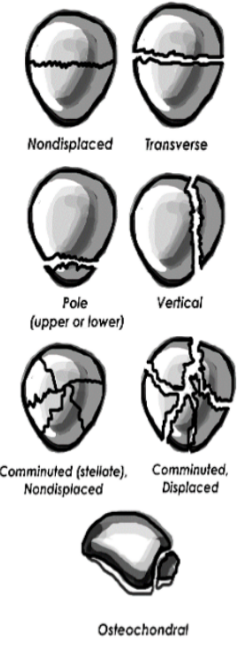Knee Injuries - Patellar Fracture
Knee Injuries: Patellar Fracture

X-ray Views
- AP knee
- Lateral knee: Best to assess for fracture displacement
- Patella view: Sunrise or Merchant view
Operative Indications (Outpatient)
- Knee extensor function disruption
- >2 mm articular displacement
- >3 mm fracture fragment separation
Acute Management
- Knee immobilizer with knee in full extension
- Weight-bearing instructions as tolerated
- If non-operative: Early weight bearing to minimize bone loss and muscle atrophy
Follow-Up Timing
Within 1 week
If non-operative:
- Muscle strengthening education
- Likely conversion to long leg cast or locking knee brace
Complications
- Nonunion
- Stiffness
- Muscle atrophy
- Osteonecrosis
References
- Schwartz A. Patella Fractures Treatment & Management, Emedicine.com (June 2016) [Source].
- Hinton RY, Sharma KM. Acute and recurrent patellar instability in the young athlete. Orthop Clin North Am. 2003 Jul;34(3):385-96. [PubMed]
- Ji G, et al . Surgical versus Nonsurgical Treatments of Acute Primary Patellar Dislocation with Special Emphasis on the MPFL Injury Patterns. J Knee Surg. 2016 Sep 14. Epub ahead of print. [PubMed]
- Petri M, et al. Current Concepts for Patellar Dislocation. Arch Trauma Res. 2015 Sep 1;4(3):e29301. [PubMed]
- Medina O, et al. Vascular and nerve injury after knee dislocation: a systematic review. Clin Orthop Relat Res. 2014 Sep;472(9):2621-9. [PubMed]